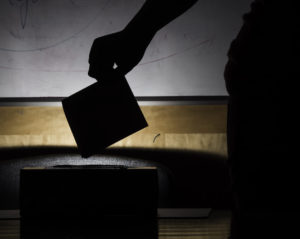
UGHELLI, Nigeria — Heavy military deployment, scattered attacks on polling centres and at least eight deaths were reported on Saturday as Nigerians went to the polls to choose governors in 29 of 36 states in Africa’s largest democracy.
Violence erupted after nightfall in Warri and Ughelli cities in Delta state in the restive south as some party supporters fearing an election loss destroyed results sheets and other voting materials.
One domestic election observer, YIAGA Africa, late Saturday asserted that military officers had barred accredited observers and party agents from at least nine vote compilation centres in the southern states of Rivers and Akwa Ibom and bandit-plagued northwestern Zamfara state.
A civil society platform of election observers, the Situation Room, blamed low voter turnout in part on “excessive and heavy deployment of military and security personnel” that created fear and worries about neutrality. Voter apathy after a troubled presidential election two weeks ago was also a factor, it said.
The Situation Room reported seven deaths, five in Rivers state. In southeastern Enugu state, police spokesman Ebere Amaraizu told The Associated Press that a ruling party supporter had been shot dead and an investigation was under way.
Some gubernatorial races had been expected to be more contentious than the presidential vote, won easily by incumbent Muhammadu Buhari, as Nigeria’s two top political parties vie for control of powerful states that in certain cases have larger budgets than some African nations.
Vote-buying for as little as 100 naira (28 cents) and a bar of soap was reported by election observers in northern Kano state, while observers and officials elsewhere noted scattered incidents of thuggery and ballot-snatching.
Both elections had been postponed by a week in a last-minute decision as the electoral commission cited numerous logistical problems in a country of some 190 million people and poor infrastructure. The turnout in the presidential election was 35 per cent, continuing a downward trend.
On Saturday, trouble began early as local officials confirmed the burning of electoral facilities in southeastern Benue and Ebonyi states.
“The hoodlums fired into the air early this morning to scare away the people before burning down the school building. But no one was injured,” civil servant Elizabeth Ukah said of the polling station in the Gwar East local government area of Benue. “All the electoral materials for the area have been destroyed.”
In Ebonyi state, community youth leader Chuma Edeh confirmed that a registration area centre was burned by suspected thugs. Nigeria’s electoral commission uses the centres to distribute materials and handle logistics.
Three such centres were burned in Ebonyi, said the Center for Democracy and Development, another election monitor. It said election materials were destroyed and 75 polling units were affected.
Nigeria’s top anti-corruption agency, the Economic and Financial Crimes Commission, in a Twitter post said it had intercepted “bags of cash meant for vote-buying.” In another post, it said a contestant for the Ogun state assembly had been arrested at a polling unit, allegedly possessing 1.7 million naira ($4,735) “neatly arranged in envelopes stashed in carrier bags.”
The AP also witnessed vote-buying in Delta state in the south, with votes going for as little as 1,000 naira.